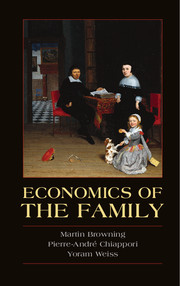Book contents
- Frontmatter
- Contents
- List of Tables
- List of Figures
- Acknowledgments
- Introduction
- PART I MODELS OF HOUSEHOLD BEHAVIOR
- PART II EQUILIBRIUM MODELS OF THE MARRIAGE MARKET
- 7 Matching on the Marriage Market: Theory
- 8 Sharing the Gains from Marriage
- 9 Investment in Schooling and the Marriage Market
- 10 An Equilibrium Model of Marriage, Fertility, and Divorce
- 11 Children and Family Structure
- Author Index
- Subject Index
9 - Investment in Schooling and the Marriage Market
Published online by Cambridge University Press: 05 July 2014
- Frontmatter
- Contents
- List of Tables
- List of Figures
- Acknowledgments
- Introduction
- PART I MODELS OF HOUSEHOLD BEHAVIOR
- PART II EQUILIBRIUM MODELS OF THE MARRIAGE MARKET
- 7 Matching on the Marriage Market: Theory
- 8 Sharing the Gains from Marriage
- 9 Investment in Schooling and the Marriage Market
- 10 An Equilibrium Model of Marriage, Fertility, and Divorce
- 11 Children and Family Structure
- Author Index
- Subject Index
Summary
The purpose of this chapter is to provide a simple equilibrium framework for the joint determination of premarital schooling and marriage patterns of men and women. Such a framework can address important empirical issues. For instance, it is well documented that the market return to schooling has risen, especially in the second half of the twentieth century. Thus it is not surprising that women's demand for education has risen. What is puzzling, however, is the different response of men and women to the changes in the returns to schooling. Women still receive lower wages in the labor market and spend more time at home than men, although these gaps have narrowed over time. Hence one could think that women should invest in schooling less than men because education appears to be less useful for them both at home and in the market. In fact, while women considerably increased their investment in education in the last four decades, men have hardly responded to the higher returns to schooling since the 1970s, eventually enabling women to overtake men in educational attainment. It has been shown by Chappori, Iyigun, and Weiss (2009) that by introducing marriage-market considerations as an additional motivation for investment in schooling, one can explain the interrelated investment patterns of women and men.
Couples sort according to education, and therefore, changes in the aggregate supply of educated individuals affects who marries whom and the division of the gains from marriage. Unlike other attributes, such as race and ethnic background, schooling is an acquired trait that is subject to choice. Acquiring education yields two different returns: (1) a higher earning capacity and better job opportunities in the labor market and (2) an improvement in the intramarital share of the surplus one can extract in the marriage market. Educational attainment influences intramarital shares by raising the prospects of marriage with an educated spouse and thus raising household income on marriage, as well as by affecting the competitive strength outside marriage and the spousal roles within marriage.
- Type
- Chapter
- Information
- Economics of the Family , pp. 371 - 413Publisher: Cambridge University PressPrint publication year: 2014



